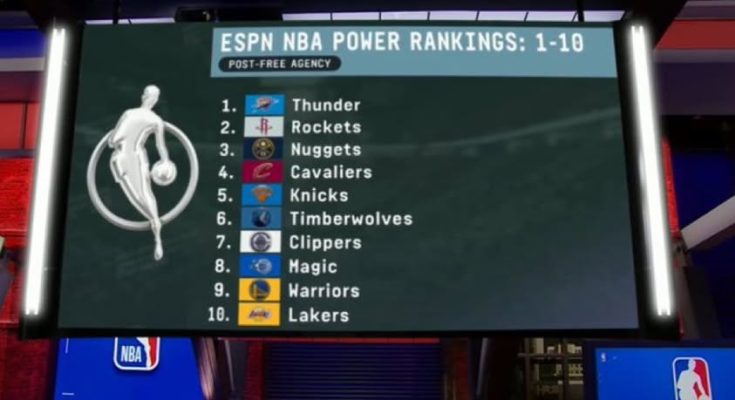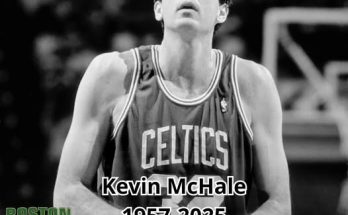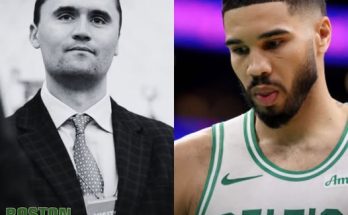The Los Angeles Lakers have long been one of the most iconic franchises in NBA history, boasting a rich legacy of championships, superstar talent, and a global fanbase that stretches across continents. However, following the 2025 free agency period, ESPN’s latest post-free agency NBA Power Rankings placed the Lakers at 10th, a ranking that has sparked considerable discussion and debate among fans, analysts, and basketball insiders alike. To understand why ESPN positioned the Lakers outside of the top tier despite their historical prestige, one must delve into the various elements that shape a team’s competitiveness, roster construction, coaching dynamics, and the broader landscape of the NBA in this ever-evolving era.
The ranking at 10th place reflects a combination of factors, including roster changes, perceived weaknesses, and the competitive rise of other franchises. In the immediate aftermath of free agency, the Lakers’ moves appeared somewhat conservative compared to the aggressive roster overhauls seen across the league. While the Lakers did secure several role players and veterans to complement their core, many critics argue that the team did not add enough star power or dynamic talent to immediately elevate them back into championship contention. The core of the team still features some of the best players in the league, but the depth and balance required for sustained success remain in question.
One of the key reasons for the Lakers’ position at 10th in the rankings relates to their free agency strategy and how it fits into the broader NBA talent ecosystem. The Lakers entered free agency with notable salary cap constraints, limiting their ability to pursue marquee names in the market. This financial reality forced the front office to focus more on role players, veterans on minimum deals, and younger prospects rather than high-profile stars. While this approach is not inherently flawed, it contrasts sharply with several other franchises that aggressively pursued and signed star-caliber players, thus reshaping the competitive landscape in their favor. Teams like the Boston Celtics, Milwaukee Bucks, and Denver Nuggets all made bold moves that elevated their perceived chances of winning the title, pushing them higher in the power rankings.
The Lakers’ top stars continue to be a crucial part of their evaluation. Despite advancing in age, the team’s cornerstone players still bring exceptional talent and leadership to the court. Their ability to stay healthy and perform at a high level will largely dictate how competitive the Lakers can be throughout the upcoming season. However, injury concerns and questions about the durability of key contributors linger. These factors contribute to the uncertainty that likely influenced ESPN’s decision to rank them 10th, as consistency and availability are vital components in a team’s quest for postseason success.
Another aspect affecting the Lakers’ ranking involves team chemistry and fit. Successful teams often require a harmonious blend of talent, complementary skill sets, and effective coaching schemes. The Lakers have historically benefited from strong leadership both on and off the court, but with a roster incorporating several new pieces, there is always an adjustment period. Integrating role players into a cohesive unit capable of executing at a high level on both ends of the floor is a complex task. Some analysts suggest that the Lakers may face challenges in finding the right balance and maximizing the effectiveness of their lineup, especially on defense, which has been an area of inconsistency in recent seasons.
Coaching remains a pivotal factor in how the Lakers are perceived. The head coach’s ability to manage egos, develop young talent, and adapt game plans to the evolving NBA landscape can make or break a team’s season. While the Lakers’ coaching staff has shown competency, the question remains whether they can extract peak performance from a roster that may lack the sheer star depth of some of their rivals. The league has seen an influx of innovative coaching strategies, and franchises with staffs that can quickly adjust and exploit matchups tend to find themselves higher in power rankings. Thus, the coaching dynamic is an undercurrent in evaluating the Lakers’ overall standing.
In the context of the league’s power balance, the Lakers find themselves in a fiercely competitive Western Conference where multiple teams have either maintained or improved their championship aspirations. The Golden State Warriors, Phoenix Suns, Dallas Mavericks, and Denver Nuggets, among others, have all made moves that bolster their potential to contend. This stacked environment means that even a team with the Lakers’ pedigree and talent can find itself slipping in rankings if it does not keep pace with the upgrades made elsewhere. ESPN’s ranking reflects this reality, acknowledging the team’s capabilities but also recognizing the depth of quality competition around them.
The perception of the Lakers as a team in a transitional phase also colors their ranking. After the glory years and recent championship runs, there is a sense that the franchise is recalibrating, attempting to blend veteran leadership with promising new talent while searching for the next wave of stars to carry the torch. This transitional label influences expectations and power rankings because it signals that the team might not be an immediate threat to win it all but rather a squad with potential to grow and develop over the season. This outlook impacts their placement as ESPN tries to balance optimism for future success with realism about the present capabilities.
Additionally, the Lakers’ defense and overall team efficiency statistics from previous seasons are critical data points analysts use to shape their rankings. The team’s defensive metrics have fluctuated, sometimes showing vulnerability against fast-paced or highly skilled opponents. In the modern NBA, defense remains a cornerstone for championship teams, and any perceived deficiencies in this area can significantly impact a team’s perceived strength. Offensively, the Lakers boast talented scorers and playmakers, but the consistency of their offense and ability to execute in clutch moments are variables under scrutiny. These analytical insights from recent performance trends feed directly into ESPN’s evaluative process.
Fan expectations and media narratives also play a subtle but notable role in shaping rankings. The Lakers, given their history and market size, operate under intense scrutiny and high standards. Analysts and journalists tend to measure them against lofty benchmarks, and any perceived shortcoming is magnified. While this sometimes leads to harsh criticism, it also underscores the franchise’s responsibility to consistently compete at the highest level. ESPN’s power rankings reflect both objective analysis and the subjective narratives that swirl around a franchise of this magnitude, making the 10th-place ranking a reflection of multiple layers of evaluation.
Looking ahead, the Lakers’ path to improving their standing will likely involve strategic moves during the season and the development of their younger players. Midseason trades, player health, and the emergence of breakout performers could propel the Lakers higher in future rankings. The front office’s ability to navigate the trade market and find complementary pieces that enhance team chemistry and balance will be crucial. Moreover, the growth of young talent within the team’s developmental pipeline offers hope for a stronger, more dynamic roster capable of climbing the competitive ladder.
The broader NBA landscape continues to evolve, with trends like pace-and-space offense, positionless basketball, and an emphasis on three-point shooting shaping team construction. The Lakers’ ability to adapt to these trends while leveraging their unique strengths will influence their competitiveness. Embracing analytics, optimizing player roles, and innovating within their play style will be key components of their strategy. ESPN’s ranking, while a snapshot in time, serves as a reminder that the Lakers must continuously evolve to maintain relevance and contend for titles in the rapidly changing league.
In summary, ESPN’s decision to rank the Los Angeles Lakers 10th in their post-free agency NBA Power Rankings is a multifaceted assessment rooted in roster composition, financial constraints, competitive context, coaching dynamics, and performance metrics. While the Lakers remain a team with significant talent and a storied legacy, the combination of cautious offseason moves, a competitive Western Conference, and questions about depth and durability has tempered expectations. The ranking reflects a realistic appraisal of where the Lakers stand in the hierarchy of NBA teams today — solidly in the mix but not yet at the pinnacle. For Lakers fans, this ranking should be seen both as a challenge and an opportunity — a call for the franchise to leverage its resources, develop talent, and make bold decisions that can elevate them back into the elite tier where championships are won and legacies are forged. The journey ahead promises to be closely watched, with the Lakers striving to translate potential into performance and reclaim their place among the NBA’s very best.



